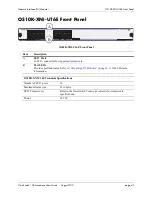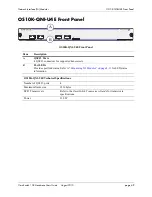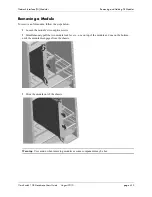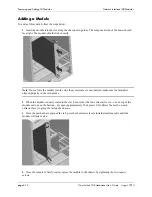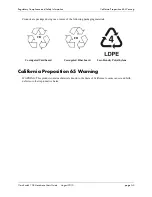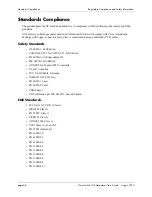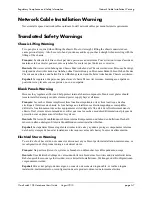
Handling Fiber and Fiber Optic Connectors
Network Interface (NI) Modules
page 4-16
OmniSwitch 10K Hardware Users Guide
August 2015
Handling Fiber and Fiber Optic Connectors
Using fiber is simple, but several important standards should always be practiced. For best results, you
should:
•
Use premium grade cables
•
Keep your fiber optic connectors clean
•
Keep the transceiver interface clean
•
Attenuate properly
For detailed information on these recommendations, refer to the sections below:
Use Premium Grade Cables
There are many brands of fiber optic jumper cables, with a wide range of quality between each
manufacturer. Premium cables do three things well:
•
They provide a good polish on the fiber optic connector endface (where the light exits the cable).
Endface geometries must be exceptionally precise and aligned to extremely tight tolerances. The better
the endface geometry, the lower the loss and more consistent the connection. Poor connector interfaces
will reflect light back into the laser, causing an increase in laser noise.
•
They mate well with other connector interfaces. Chances are the manufacturer of the jumper cable will
not be the same as the manufacturer of the transceiver connector interface. Premium jumper cables
mechanically align themselves well into most transceiver interfaces. This provides both better
performance as well as better repeatability. You will always see a variance in transceiver power due to
connector alignment, good jumper cables help reduce this variance.
•
They continue to mate well after many insertions and removals. Premium grade jumper use premium
connectors that maintain their mechanical integrity up to and beyond 2000 insertion cycles.
For better repeatability, always use duplex (two connectors fused together and terminated to two cables)
connectors on your jumper cables when connecting to a fiber-optic transceiver.
Never bend the fiber optic cable beyond its recommended minimum bend radius. This introduces bend
losses and reflections that will degrade the performance of your system. It can also damage the fiber,
although fiber is much tougher than most would assume. Still, it is highly recommended to buy only
jumper cables with 3mm Kevlar jacketing, which offer superior protection and longer life.
Keep Your Fiber Optic Connectors Clean
Unlike electrical connectors, fiber-optic connectors must be extremely clean in order to ensure optimum
system performance. Microscopic particles such as dust on the connector endface (i.e., where the light
exits the connector) can degrade the performance of your system, often to the point of failure.
If you have low-power output from a fiber-optic transceiver or a fault signal from your equipment, begin
the troubleshooting process by cleaning your fiber-optic connectors per manufacturer recommendations.






